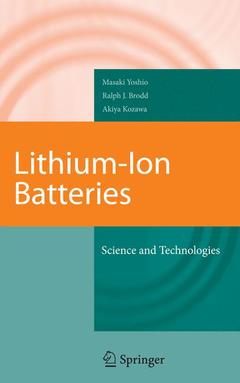Description
Lithium-Ion Batteries, 2009
Science and Technologies
Coordinators: Yoshio Masaki, Brodd Ralph J., Kozawa Akiya
Language: English
Subjects for Lithium-Ion Batteries:
Lithium-Ion Batteries
Publication date: 10-2010
452 p. · 15.5x23.5 cm · Paperback
Publication date: 10-2010
452 p. · 15.5x23.5 cm · Paperback
Lithium-ion batteries: science & technologies (POD)
Publication date: 01-2009
Support: Print on demand
Publication date: 01-2009
Support: Print on demand
Description
/li>Contents
/li>Comment
/li>
In developing electrochemical cells, one must keep in mind that the real goal is to package and control all the materials and components (cathode and anode active materials, electrolytes, separators, current collectors etc.) in a limited volume to enable maximum energy storage without creating any safety problems. In this manner, Li-ion batteries (LIB) were first introduced to practical use in 1991. This book contains an in-depth review of electrode materials, electrolytes and additives for LIB, as well as indicators of the future directions for continued maturation of the LIB.
Synopsis of the Lithium-Ion Battery Markets.- A Review of Positive Electrode Materials for Lithium-Ion Batteries.- Carbon Anode Materials.- Role-Assigned Electrolytes: Additives.- Carbon-Conductive Additives for Lithium-Ion Batteries.- Applications of Polyvinylidene Fluoride-related materials for Lithium-Ion Batteries.- SBR Binder (for Negative Electrode) and ACM Binder (for Positive Electrode).- Production Processes for Fabrication of Lithium-Ion Batteries.- Polyanionic Cathode-Active Materials.- Overcharge Behavior of Metal Oxide-Coated Cathode Materials.- Development of Metal Alloy Anodes.- HEV Application.- Flame-Retardant Additives for Lithium-Ion Batteries.- High-Energy Capacitor Based on Graphite Cathode and Activated Carbon Anode.- Development of LiCoO 2 Used for Rechargeable Lithium-Ion Battery.- Cathode Materials: LiNiO2 and Related Compounds.- Manganese-Containing Cathode-Active Materials for Lithium-Ion Batteries.- Trends in Carbon Material as an Anode in Lithium-Ion Battery.- Functional Electrolytes Specially Designed for Lithium-Ion Batteries.- Lithium-Ion Battery Separators1.- Polymer Electrolyte and Polymer Battery.- A Novel Hard-Carbon Optimized to Large-Size Lithium-Ion Secondary Batteries.- LiMn2O4 as a Large-Capacity Positive Material for Lithium-Ion Batteries.
Editors and contributors are all experts in the field
All contributors are Japanese or of Japanese ancestry
Presents a thorough survey of the most up-to-date technologies in Li-Ion batteries
© 2024 LAVOISIER S.A.S.




